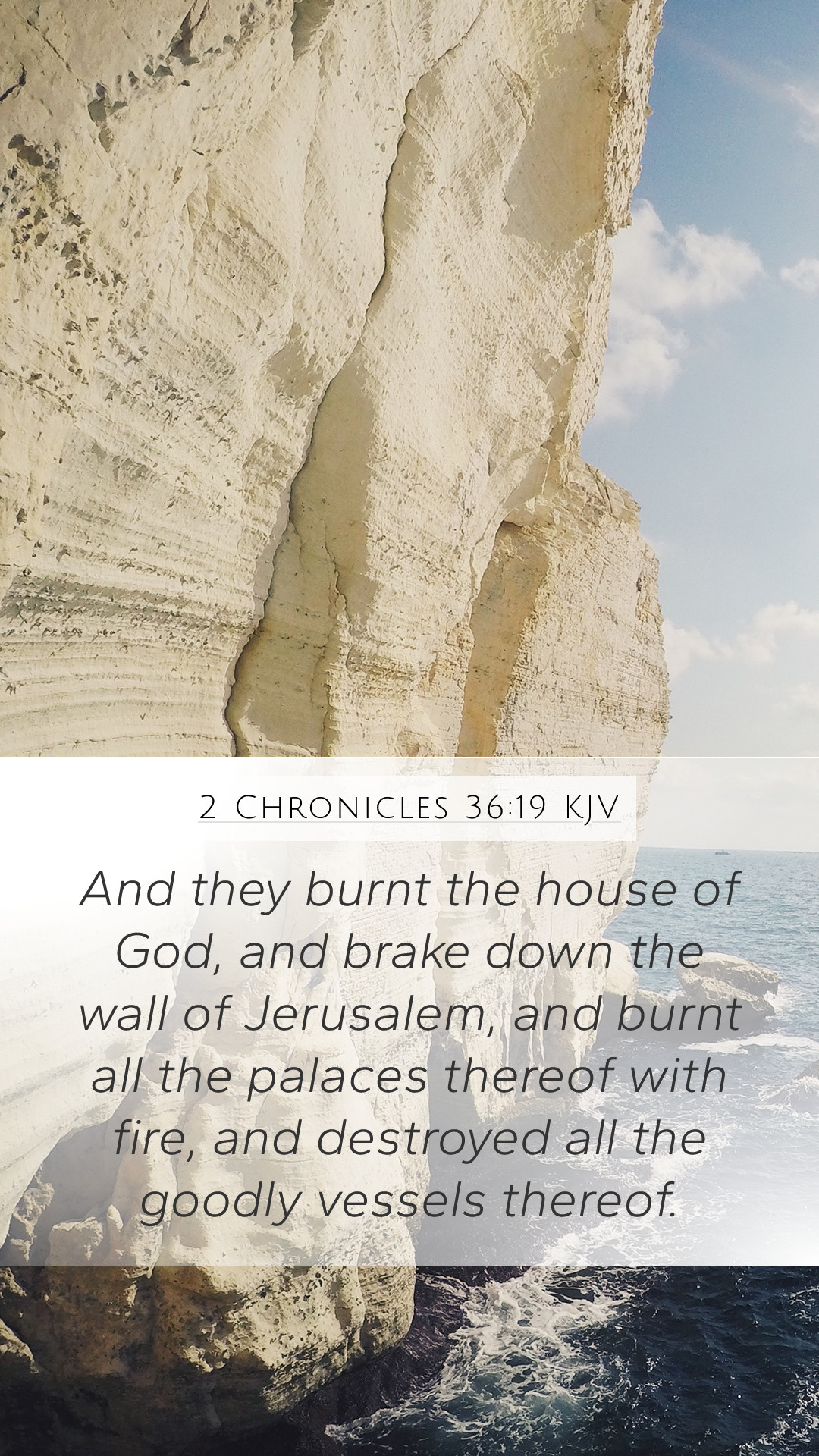Bible Verse Meaning and Interpretation of 2 Chronicles 36:19
2 Chronicles 36:19 reads: "And they burnt the house of God, and brake down the wall of Jerusalem, and set fire to all the cities thereof, and destroyed all the goodly vessels thereof."
This verse depicts a tragic moment in the history of Israel, describing the destruction of Jerusalem and the temple. It holds deep significance within the Bible, as it serves as both a literal account of historical events and a metaphorical commentary on disobedience and divine judgment.
Contextual Background
The events described in this passage are set in the context of the Babylonian conquest of Jerusalem, which occurred in 586 B.C. The chronicler reports on the culmination of Israel's turning away from God, leading to severe consequences. Understanding the historical and spiritual implications of this verse requires a careful analysis of the preceding events in Israel's history.
Commentary Insights
Drawing from various public domain commentaries, we can gather the following insights into this poignant verse:
-
Matthew Henry's Commentary: Henry emphasizes the profound sorrow associated with the destruction of the temple. He notes that this calamity was a direct result of Israel's rebellion against God, and by neglecting their covenant with Him, they brought this ruin upon themselves. Henry stresses that the "house of God" was not just a physical structure but represented God's presence among His people.
-
Albert Barnes' Notes: Barnes interprets this destruction as a symbol of divine judgment. He points out that the "goodly vessels" represent not only material wealth but also the value of spiritual and sacred things that were lost due to disobedience. Barnes highlights the gravity of turning away from God, warning readers of the consequences of such actions.
-
Adam Clarke's Commentary: Clarke offers a perspective on the significance of the "breaking down" of Jerusalem's walls. He underscores that these walls had once stood as a defense for the city, signifying God's protection. Their destruction reflects the complete surrender of the people to their enemies due to their sins. Clarke also draws on the theological implications, suggesting that God's glory departed from Israel as they forsook His ways.
Spiritual Lessons
The collapse of Jerusalem and the temple in 2 Chronicles 36:19 serves as a warning to believers today. It teaches that God is a protective, just deity who desires obedience and repentance. The following lessons can be gleaned:
- The Importance of Obedience: Just as Israel faced destruction, modern believers are called to live according to God's commandments to avoid spiritual decay.
- The Consequence of Sin: Sin can lead to separation from God and loss of spiritual blessings, as evidenced by Israel's fate.
- The Hope of Restoration: Despite the destruction, themes of hope and restoration can be found throughout scripture, reminding us that repentance can lead to reconciliation with God.
Cross References
This verse is related to numerous other passages in the Bible that illustrate similar themes of judgment and restoration:
- 2 Kings 25:8-17 - Details the Babylonian siege and destruction of the temple.
- Lamentations 1:1-2 - Describes the sorrow and desolation of Jerusalem following its downfall.
- Jeremiah 52:12-16 - Accounts of the fall of Jerusalem and the carrying away of the people into captivity.
Conclusion
The passage of 2 Chronicles 36:19 serves as a crucial reminder of the consequences of abandoning God's covenant and the need for consistent faith and obedience. Through careful Bible study insights and reflection on Scripture analysis, believers can grasp the meaning of Bible verses like this one and apply its lessons to daily life. As we engage with Scripture, may we seek to understand, interpret, and apply these teachings with reverence and commitment.
Further Study
For those interested in diving deeper into Biblical exegesis and the understanding of difficult Bible passages, engaging in online Bible study or utilizing Bible study resources may prove beneficial. Consider exploring how historical context impacts our interpretation and application of Scripture to glean rich insights from passages like 2 Chronicles 36:19.


